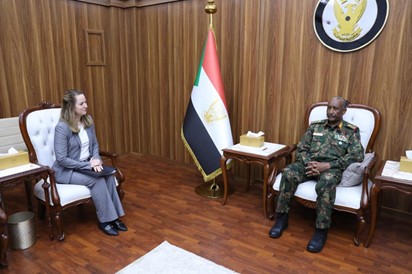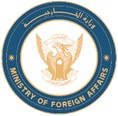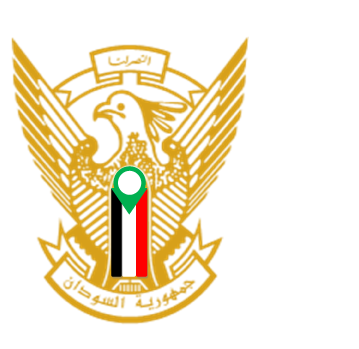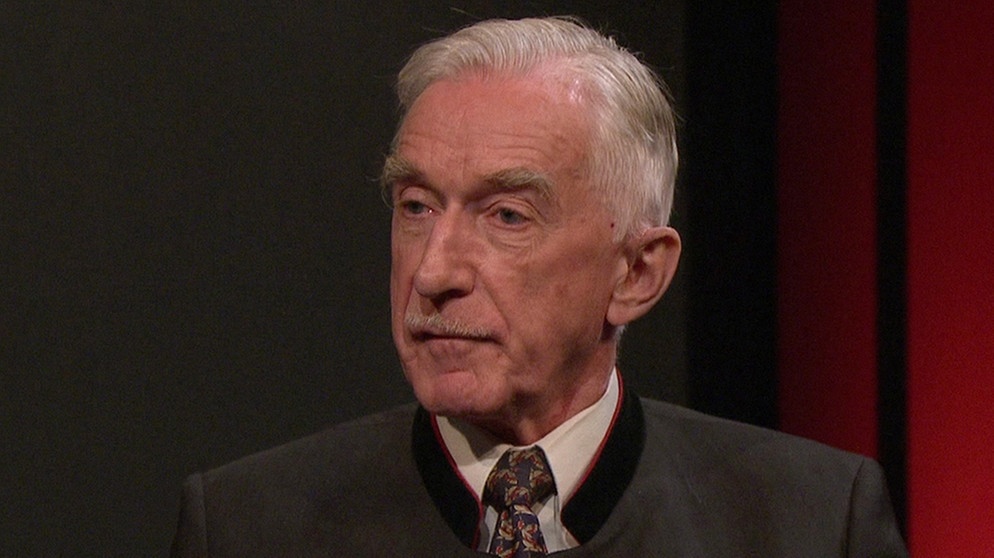NEWS
Newsblog
- Details
- Zugriffe: 0
TSC President Commander-in-Chief of Armed Forces meets defectors from the terrorist Al-Dagalo militia

President of the Transitional Sovereignty Council (TSC), Commander-in-Chief of the Armed Forces, General Abdel-Fattah Al-Burhan, met on Wednesday with a group of defectors from the terrorist rebel Rapid Support Forces (RSF), Al-Dagalo militia, headed by Dr. Abdul-Gadir Ibrahim Ali.
The meeting discussed the violations and atrocities committed by this militia against innocent civilians in various parts of Sudan. Dr. Ali said, in a press statement, that this group's joining the national ranks came out of a firm conviction, stressing their standing with the armed forces in one trench. He added, "Through the position we have taken, we have disavowed the outlaw RSF," referring to a series of crimes it committed against the Sudanese people, which constitute clear war crimes, calling for the necessity of bringing the perpetrators of these crimes to international courts. Dr. Ali hailed the great sacrifices that the armed forces and other regular forces and mobilized personnel have been making in order to defeat the brutal rebellion. Dr. Ali appealed to all those who stand with the rebellion to side with the choice of the homeland, adding that the door is still open for them to disavow the actions of this terrorist militia.
For his part, Dr. Mohamed Abdullah Wad Abuk explained that this group militia splintered from conviction sided with the state and its institutions, stressing that the current aggression against the country threatens the entity of Sudanese society and the future of the Sudanese state, indicating that any attempt to tear apart the institution of the armed forces is an attempt to strike the state and its established institutions and target the security and stability of the homeland. Wad Abuk pointed to the regional and international challenges facing Sudan, which require solidarity and cooperation among all the people of the homeland.
- Details
- Zugriffe: 0
TSC President meets IOM Director-General
 President of the Transitional Sovereignty Council (TSC), Commander-in-Chief of the Armed Forces, Gen. Abdel-Fattah Al-Burhan, met on Tuesday with the Director-General of the International Organization for Migration (IOM), Ms. Amy E. Pope, in the presence of the Minister of Interior and the Undersecretary of the Ministry of Foreign Affairs. Ms. Pope said, in a press statement, that the numbers of Sudanese refugees due to the ongoing war in Sudan have been constantly increasing and have reached record levels, indicating that IOM provides a lot of assistance to refugees, but it is not enough, given the large numbers of Sudanese refugees who have lost their homes, jobs and lives.
President of the Transitional Sovereignty Council (TSC), Commander-in-Chief of the Armed Forces, Gen. Abdel-Fattah Al-Burhan, met on Tuesday with the Director-General of the International Organization for Migration (IOM), Ms. Amy E. Pope, in the presence of the Minister of Interior and the Undersecretary of the Ministry of Foreign Affairs. Ms. Pope said, in a press statement, that the numbers of Sudanese refugees due to the ongoing war in Sudan have been constantly increasing and have reached record levels, indicating that IOM provides a lot of assistance to refugees, but it is not enough, given the large numbers of Sudanese refugees who have lost their homes, jobs and lives.
IOM Director-General pointed out that the meetings she held with officials in the Ministries of Foreign Affairs and Interior were to tighten coordination regarding the provision of services to refugees and improve resources. She described the meeting with TSC President as fruitful and constructive. For his part, the Minister of Interior, Major General Police (Rtd) Khalil Pasha Sayreen, said that the visit of the IOM Director-General to Sudan came within the framework of standing on the field on the humanitarian conditions resulting from the war and assessing the situation on the ground, in addition to providing the required assistance to those who deserve it, especially since there are large numbers of Sudanese who have sought refuge in neighboring countries, in addition to the fact that Sudan also hosts huge numbers of refugees from neighboring countries, hoping that the visit of the IOM Director-General contributes to improving the humanitarian conditions facing Sudan due to internal displacement and asylum in neighboring countries.
- Details
- Zugriffe: 0
The Republic of Sudan
Ministry of Foreign Affairs
Office of the Spokesperson and Media Directorate

Press Statement
Villages and towns in Eastern Al-Jazirah and Al-Butana regions are currently facing savage retaliatory campaigns by the Janjaweed militia, following the defection of certain leaders from within their ranks. These horrifying campaigns target civilians based on tribal and regional affiliations, amounting to acts of genocide and ethnic cleansing.
The number of victims from these criminal campaigns is estimated to be in the hundreds, encompassing both fatalities and injuries, while several thousands more have been forcibly displaced from their villages.
The Government of Sudan urgently calls on the international community to condemn these actions swiftly and forcefully, and to take necessary measures to hold the perpetrators, the leaders and sponsors of the terrorist militia accountable, as well as cessation of arms and mercenary flows to the terrorist militia.
Undoubtedly, the silence and indifference of the international community toward these crimes only embolden the Militia and its regional sponsor to continue committing massacres and acts of genocide with impunity.
- Details
- Zugriffe: 0
The Republic of Sudan
Ministry of Foreign Affairs
Office of the Spokesperson and Media Directorate

Press Release
A number of Western countries issued on 18 October 2024 a joint statement on the humanitarian situation in Sudan, that is evidently biased against the Government of Sudan and the Sudanese Armed Forces (SAF).
The statement arbitrarily accused SAF and Government of Sudan of systematically obstructing humanitarian assistance. Such an unfounded accusation can only be understood as an attempt to downplay the terrorist militia’s use of starvation as a weapon in its war against the Sudanese people. This is exemplified by its ongoing siege of El Fasher, escalating its shelling of civilians, and the blockade of humanitarian aid deliveries destined to the city. The UN Security Council has failed to implement its Resolution 2736, passed in June, which demands the Militia to halt its siege on El Fasher and de-escalate the situation. The Militia has, however, responded exactly with the opposite, assured of impunity, for its regional sponsor became a member of the self-proclaimed “Aligned for Advancing of Lifesaving and Peace in Sudan,” (ALPS) as cited in the statement. Contrary to the statement, the Humanitarian Aid Commission, with its extensive experience in humanitarian work, continues to play the leading role in facilitating and expediting all processes related to aid delivery. It is unfortunate that the statement equates this well-established national institution with a fictitious body created by the terrorist militia as a cover for its crimes, just as it misuses the logo of UN agencies for the same purpose, without being met with a seious response from Western countries.
Thus, the claim that there is a deliberate delay in issuing visas or movement permits is entirely baseless. This accusation is disproven by the fact that over 90% of visa requests are readily approved. As for movement permits, they are meant to protect humanitarian workers in war situations, pursuant to the Government’s responsibility for their safety. It is perplexing that the statement calls for humanitarian organizations to operate independently from the Government oversight, a practice that has no precedent in the history of humanitarian work, unless the intention is to undermine state authority, with a view to fomenting a statelessness situation in the country.
The statement was released on the same day that the Government of Sudan introduced additional steps to facilitate humanitarian aid delivery by opening the airports of Kassala, Dongola, and Kadugli for aid flights, bringing the number of operational airports to six, alongside seven land crossings. Yet, the statement chose to ignore these measures, reducing the issue of aid access to the using of a single crossing point, which, in reality, has been used as an entry route for weapons and supplies for the Militia to commit massacres and starve civilians.
The statement furthermore overlooked the poor record of these same countries in fulfilling their humanitarian aid pledges, even with the opening of the Adré crossing. It equally ignored the widespread hunger in the Sudanese refugee camps in Chad, a country these nations portray as the main gateway for aid, and failed to mention that the Jeddah Agreement addresses the issue of aid across conflict lines.
The statement, therefore, epitomizes the worst forms of politicization of humanitarian work. Conversely, the generous humanitarian support offered by friendly and sisterly nations, without flaunting or political agenda, must be commended.


